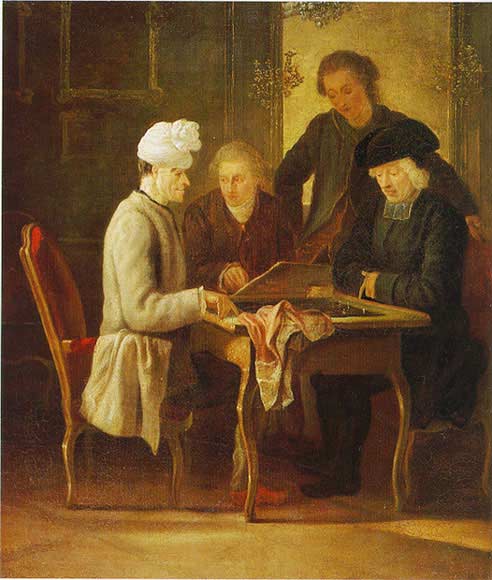|
 Voltaire by Huber
Voltaire by Huber
From the site, mieux jouer aux
échecs, we learn:
Voltaire a un familier genevoix depuis son installation à Ferney;
le peintre Huber. La princesse Daschoff, dame d'honneur de Catherine
II de passage à Genève en 1771 écrit dans ses mémoires: "Hubert et
Voltaire combattaient souvent aux échecs. Voltaire perdait toujours,
et dans ces occasions, il ne manquait jamais de laisser éclater sa
mauvaise humeur." Un tableau d'Huber se trouve au musée de l'Ermitage
à Saint Petersbourg: "Voltaire jouant aux échecs avec le père Adam"
Voltaire est souscripteur de l'édition de 1777 de "l'analyse des
échecs" de Philidor, édition remaniée sur les conseils du célèbre
Diderot, ami de Philidor.
Une estime réciproque a réuni Voltaire et le père Adam en plus du jeu
d'échecs quand Voltaire part à Paris en 1778, le père Adam, 72 ans est
congédié par Mme Denis après 17 ans de services, Voltaire lui verse
une pension de 700 livres. Curieusement, Voltaire a peu écrit sur les
échecs sauf ceçi:
"Le jeu que nous appelons "des échecs" par corruption, fut inventé par
eux (les indiens) et nous n'avons rien qui en approche. Il est
allégorique, comme leur fables, c'est l'image de la guerre. Le nom de
Schack qui veut dire prince, et de pion, qui signifie soldat, se sont
conservés." Essai sur les mœurs III
Voltaire frequented the Café de la
Régence where he played chess with Philidor and Jean-Jacques
Rousseau as well as once, in 1748, having played a correspondence game
with Fredrick the Great
of Prussia by courier.
The Café de la
Régence, by a Chess-player
Fraser's Magazine, Vol. XXII July to December, 1840
transcribed by Mark Weeks
The Régence was established as a rendezvous for the
literati of the day, under the government of the Duke of Orleans, and like
Will's in London, became, from its eligible position, the haunt of the
most celebrated esprits of France during the eighteenth century. Voltaire,
the two Rousseaus, the profligate Duc de Richelieu, Marshal Saxe, Chamfort,
St. Foix, Benjamin Franklin, Marmontel, Philidor, and Grimm, are but a few
of the men of note who constantly frequented the Régence in early times.
The very chairs and tables acquired name and fame from classical
association; and, till quite recently, the master of the establishment
might be heard commanding his attendants, in tones of pride to "Serve Jean
Jacques," -- "Look to Voltaire," -- the identical tables at which this
pair of philosophes were wont daily to play chess, being still at that
time in existence, named from the departed great. These sacred shrines are
now superseded by marble slabs; coal-gas sparkles in sun-like lustres; and
Voltaire could hardly recognise his favoured lounge, save from the
low-ceiled room unaltered in its proportions. A dingy portrait of Philidor
yet hangs, I am glad to see, against the wall. To a chess antiquary, the
relic would be worth purchase at its weight in gold.
|

